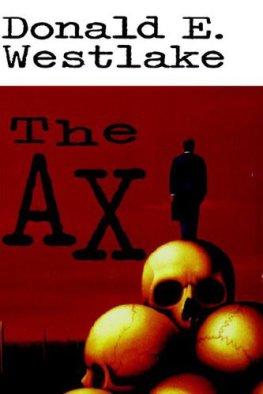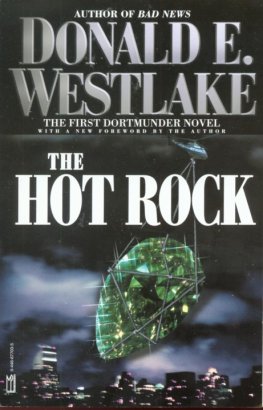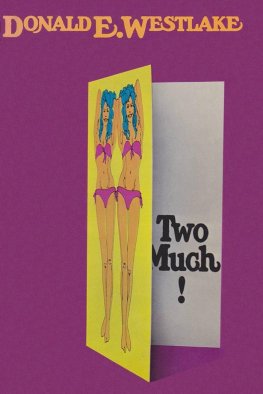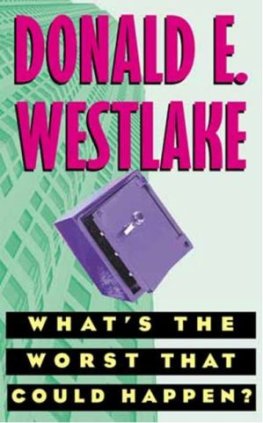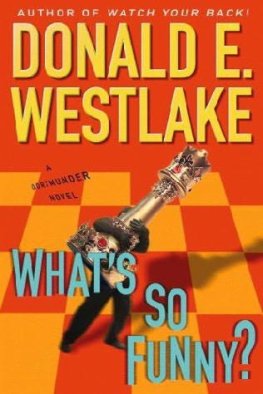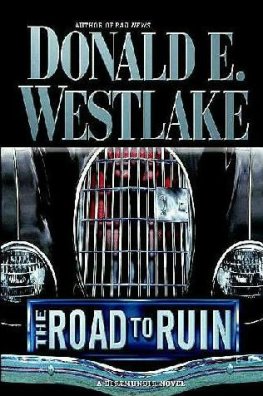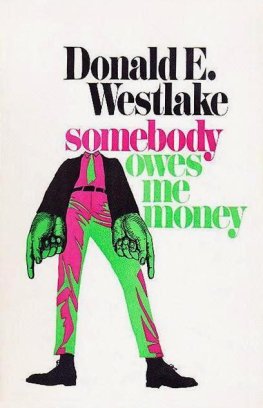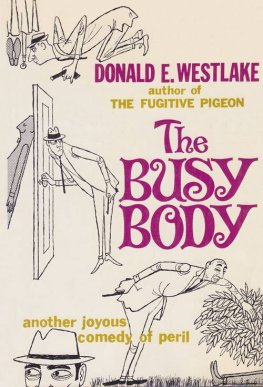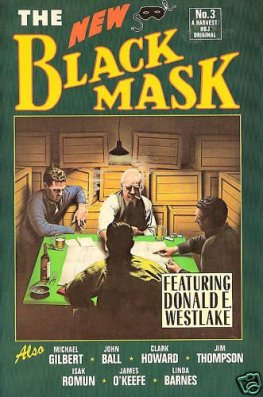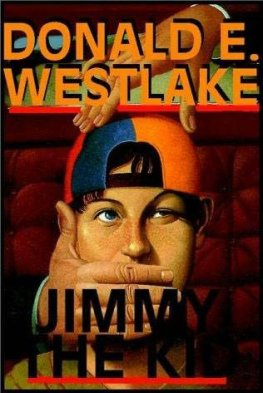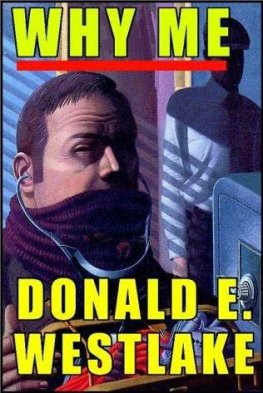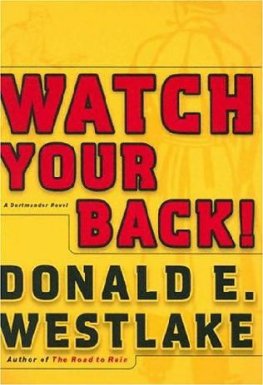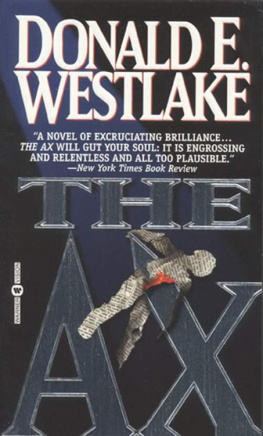This is for my father, Albert Joseph Westlake, 1896-1953
The old superstition about fiction being "wicked" has doubtless died out in England, but the spirit of it lingers in a certain oblique regard directed toward any story which does not more or less admit that it is only a joke. Even the most jocular novel feels in some degree the weight of the proscription that was formerly directed against literary levity: the jocularity does not always succeed in passing for orthodoxy. It is still expected, though perhaps people are ashamed to say it, that a production which is after all only a 'make-believe' (for what else is a 'story'?) shall be in some degree apologetic shall renounce the pretension of attempting really to represent life. This, of course, any sensible, wide-awake story declines to do, for it quickly perceives that the tolerance granted to it on such a condition is only an attempt to stifle it disguised in the form of generosity. The old evangelical hostility to the novel, which was as explicit as it was narrow, and which regarded it as little less favourable to our immortal part than a stage-play, was in reality far less insulting. The only reason for the existence of a novel is that it does attempt to represent life.
Henry James,
The Art of Fiction, 1888
If you're doing what you think is right for everyone involved, then you're fine. So I'm fine.
Thomas G. Labrecque, CEO Chase Manhattan Bank
I've never actually killed anybody before, murdered another person, snuffed out another human being. In a way, oddly enough, I wish I could talk to my father about this, since he did have the experience, had what we in the corporate world call the background in that area of expertise, he having been an infantryman in the Second World War, having seen "action" in the final march across France into Germany in '44'45, having shot at and certainly wounded and more than likely killed any number of men in dark gray wool, and having been quite calm about it all in retrospect. How do you know beforehand that you can do it? That's the question.
Well, of course, I couldn't ask my father that, discuss it with him, not even if he were still alive, which he isn't, the cigarettes and the lung cancer having caught up with him in his sixty-third year, putting him down as surely if not as efficiently as if he had been a distant enemy in dark gray wool.
The question, in any case, will answer itself, won't it? I mean, this is the sticking point. Either I can do it, or I can't. If I can't, then all the preparation, all the planning, the files I've maintained, the expense I've put myself to (when God knows I can't afford it), have been in vain, and I might as well throw it all away, run no more ads, do no more scheming, simply allow myself to fall back into the herd of steer mindlessly lurching toward the big dark barn where the mooing stops.
Today decides it. Three days ago, Monday, I told Marjorie I had another appointment, this one at a small plant in Harrisburg, Pennsylvania, that my appointment was for Friday morning, and that my plan was to drive to Albany Thursday, take a late afternoon flight to Harrisburg, stay over in a motel, taxi to the plant Friday morning, and then fly back to Albany Friday afternoon. Looking a bit worried, she said, "Would that mean we'd have to relocate? Move to Pennsylvania?"
"If that's the worst of our problems," I told her, "I'll be grateful."
After all this time, Marjorie still doesn't understand just how severe our problems are. Of course, I've done my best to hide the extent of the calamity from her, so I shouldn't blame Marjorie if I'm successful in keeping her more or less worry-free. Still, I do feel alone sometimes.
This has to work. I have to get out of this morass, and soon. Which means I'd better be capable of murder.
The Luger went into my overnight bag, in the same plastic bag as my black shoes. The Luger had been my father's, his one souvenir from the war, a sidearm he'd taken from a dead German officer that either he or someone else had shot, earlier that day, from the other side of the hedgerow. My father had removed the clip full of bullets from the Luger and transported it in a sock, with the gun itself traveling in a small dirty pillowcase he'd taken from a half-wrecked house somewhere in muddy France.
My father never fired that gun, so far as I know. It was simply his trophy, his version of the scalp you take from your defeated enemy. Everybody shot at everybody and he was still standing at the end, so he took a gun from one of the fallen.
I too had never fired that gun, nor any other. It frightened me, in fact. For all I knew, if I were to pull the trigger with the clip in place in the butt, the thing would blow up in my hands. Still, it was a weapon, and the only one to which I had ready access. And there was certainly no record of its existence, at least not in America.
After my father died his old trunk was moved from his spare room to my basement, the trunk containing his army uniform and folded duffel bag and a sheaf of the orders that had moved him from place to place, way back then, in the unimaginable time before I was born. A time I like to think of as simpler and cleaner than ours. A time in which you knew with clarity who your enemies were, and they were who you killed.
The Luger, in its pillowcase, was at the bottom of the trunk, beneath the musty-smelling olive-drab uniform, its clip lying beside it, no longer concealed in that long-ago sock. I found it down there, the day I made my decision, and brought it out, and carried gun and clip up to my "office," the small spare room we used to call the guest room before I was at home all the time and in need of an office. I closed the door, and sat at the small wood table I used as a desk bought last year at a lawn sale offered by some particularly desperate householder about ten miles from here and studied the gun, and it seemed to me clean and efficient-looking, without rust or obvious injury. The clip, this small sharp metal machine, felt surprisingly heavy. There was a slit up the rear of it, through which could be seen the bases of the eight bullets it contained, each with its little round blind eye. Touch that eye with the firing mechanism of the gun, and the bullet leaps off on its only journey.
Could I just insert clip into gun, point, and pull the trigger? Was there risk involved? Afraid of the unknown, I drove to the nearest bookstore, one of the chains, in a mall, and found a little manual on handguns, and bought it (another expense!). This book suggested I oil various parts, and so I did, with Three-in-One oil. The book suggested I try dry-firing the gun pull the trigger without the clip or any bullets in place and I did, and the click sounded authoritative and efficient. It seemed that I did have a weapon.
The book also suggested that fifty-year-old bullets might not be entirely trustworthy, and told me how to empty and reload the clip, so I went to a sporting goods store across the state line in Massachusetts and with no trouble at all bought a little heavy box of 9-millimeter bullets and brought them home, where I thumbed eight of them into the clip, pressing each sleek torpedo down against the force of the spring, then sliding the clip up into the open butt of the gun: click.
Fifty years this tool had lain in darkness, under brown wool, wrapped in a French pillowcase, waiting for its moment. Its moment is now.
I practiced with the Luger, driving away from home one sunny midweek day last month, April, driving thirty-some miles westward, across the state line into New York, until I found a deserted field next to a minor winding two-lane blacktop road. Hilly woods stretched upward, dark and tangled, beyond the field. There I parked the car on the weedy verge and walked out across the field with the gun a heavy weight in the inside pocket of my windbreaker.

